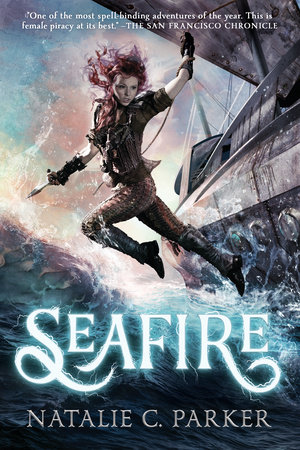One of my favorite storytelling tropes is the found family. I thought Mad Max: Fury Road was one of the best movies of the past decade. I still unironically enjoy pirate stories. Badass ladies are badass.
So Seafire by Natalie C. Parker is checking a lot of my boxes.
 Seafire is a swashbuckling dystopia following Caledonia Styx, a young woman on the run from a powerful warlord Aric Athair. After her family is ambushed and murdered by a crew of the warlord’s Bullets — loyal soldiers groomed from childhood for violence and controlled by mandatory drug addiction — Caledonia is forced to turn from refugee to pirate captain, sailing the high seas with her all-female crew of rebels and renegades aboard the Mors Navis, taking the fight to Aric’s forces by targeting his fleet of floating garden barges where the flowers that fuel his drug production are grown.
Seafire is a swashbuckling dystopia following Caledonia Styx, a young woman on the run from a powerful warlord Aric Athair. After her family is ambushed and murdered by a crew of the warlord’s Bullets — loyal soldiers groomed from childhood for violence and controlled by mandatory drug addiction — Caledonia is forced to turn from refugee to pirate captain, sailing the high seas with her all-female crew of rebels and renegades aboard the Mors Navis, taking the fight to Aric’s forces by targeting his fleet of floating garden barges where the flowers that fuel his drug production are grown.
But when one of Aric’s Bullets tries to defect to Caledonia’s side, saving the life of her best friend in the process, the captain’s survival tactics and deep-seated beliefs are called into question. On the one hand, he represents everything she and her crew despise, and keeping him aboard could mean all of their deaths; after all, trusting a Bullet was what led to her family’s deaths. On the other, if he’s telling the truth, he might hold the key to taking down Aric once and for all — and to Caledonia being reunited with the little brother that she thought she’d already lost long ago.
Seafire was one of the last books I read in 2019, and also one of the hardest to put down. Caledonia and her crew begin the story desperate, in danger, and itching for a fight, and the tension rarely slows from there. The calm moments are spent surveying the damage to her ship, the state of her crew, and the chances that any of them will survive to see tomorrow. The exciting moments are spent waging guerilla naval warfare against the zealous forces of a ruthless tyrant, in dystopian warships that are at the same time high-tech and cobbled together from what precious few materials the girls can get their hands on.
In between and in the midst of all the action, the interpersonal moments between the crewmembers of the Mors Navis are what kept me hooked hardest of all. Caledonia’s crew is made up entirely of those who’ve all lost family, friends, and homes to Aric Athair — all of them female, since the warlord tends to conscript and convert every male in his territory starting in childhood. The result is a strong, close-knit sisterhood of pirates from all walks of life, all with different talents and colorful personalities, all of whom react differently at the sudden presense of a sincere-seeming ex-enemy in their midst.
The conflict and rationalization that ensues, the clash between the need to be better than their enemy and the stark pragmatism necessary for survival, is masterfully portrayed as well as a driving force for the rest of the plot. And Caledonia herself makes for an incredibly intriguing protagonist, her cold and sometimes callous decisions made understandable by her constant, urgent need to keep her newfound family safe at all costs, and by her once-bitten-twice-shy guilt from the last time she mistakenly showed mercy and got her loved ones killed for it.
The end result is a book that’s both harrowing and heartwarming, with plenty of seafaring action, emotional examinations of guilt and forgiveness, and a strong message on the necessity of moving past loss to keep fighting for whatever and whoever is left that’s worth protecting.
Give it a read, and it will shiver the timbers of your heart.

